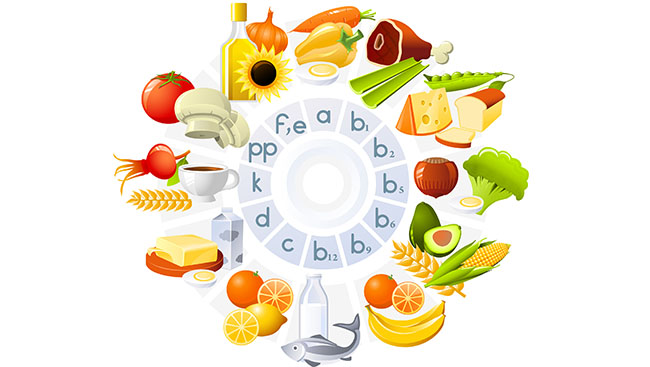Anutrition label can read like a foreign alphabet. From A to K and B1 to B6, it can be difficult to determine which letter or number will help you lose weight, decrease your stress, boost your energy or possibly even all of the above. Ensuring you’re ingesting the right amounts to receive the maximum benefit doesn’t have to be as hard as translating a language you don’t know; a little understanding of the functions and food sources of the most common nutrients can help you feed the needs of a healthy and happy body.
WHAT IS A VITAMIN?
A vitamin is a group of organic compounds the body requires and uses in limited amounts. They are nutrients obtained through one’s diet to maintain normal growth and development.
“Vitamins are essential for life and health,” says Michelle Shepherd, registered dietitian and owner of Westcoast Nutrition. “They are an integral part of every body system, and are key to complete the chemical reactions needed to create energy and repair our cells. Without enough vitamins we limit our body’s capacity to work and heal.”
Nutrition consultant and registered dietitian Natalie Brown adds, “Vitamins do not provide energy, but they do help the body grow and function by boosting the immune system, strengthening bones, helping with eyesight, and fighting infection.”
There are 13 essential vitamins, all of which are needed for our body to function. They can be grouped into two categories; fat soluble and water soluble. Fat soluble vitamins are stored
in the body’s fatty tissue, used when needed, and can quickly become toxic when in abundance. These include vitamins A, D, E and K. Water soluble vitamins, which include B1, B2, B3, B6, B12, C, biotin, folate, and pantothenic acid are not stored in large amounts in the body, necessary in frequent but small doses, and excreted by the kidneys when in excess.
Recommended amounts of all vitamins differ based on the specific vitamin and vary between demographics. “Our requirements can change based on age, gender and health,” explains Shepherd. “Older adults need more vitamin B12 as we become less efficient at absorbing it as we age. Young women need more iron to make up for losses during menstruation. Those with lots of repair to do, such as after surgery or if you have a history of smoking, benefit from increased intake of food sources of vitamins, minerals and anti-oxidants to support that process.” It’s best to consult a dietitian to determine if your daily needs are being met and what supplements may be of benefit to your body.

While the focus on vitamins can seem big, they are only needed in small amounts. “The best way to meet your daily needs is through natural food sources,” explains Brown. “Foods that are nutrient-dense not only contain essential vitamins and minerals but also contain dietary fibre and other naturally-occurring health benefits.”
Food should always be consumed first, as a healthy diet most often provides enough to meet the recommended intake. “Most vitamins and minerals can be obtained through a well-planned diet based on whole, minimally processed foods,” says Shepherd, suggesting that each meal should contain a plate half full of brightly-coloured fruits and vegetables to ensure that key nutrients are being consumed in beneficial quantities.
SUPPLEMENTS
Despite the ease of a balanced diet, ensuring all 13 vitamins are accounted for can still seem overwhelming. It’d be tempting to turn to a supplement to make eating easier, but experts caution against their use for many healthy eaters. “Whole foods provide optimal balance that your body absorbs and uses more efficiently than supplements,” says Brown.
Supplements should be used when your diet lacks a certain vitamin based on dietary restrictions, food aversions or certain lifestyle situations requiring more than food sources can provide. “While it can be beneficial to supplement certain vitamins, many do not seem to work as well in a pill as they do when we take them in their natural form in food,” cautions Shepherd. “We’re still learning how nutrients interact in a food and often taking single vitamin supplements just isn’t that effective to boost health. Many vitamins and minerals work together in our body, so taking one or the other just doesn’t provide the right balance.”
While it’s easy to think that more of a good thing must be better when it comes to our health, it isn’t so with vitamins. Too much may be toxic; supplements may not be necessary if your diet is full of good greens and fresh fruits. “Do not purchase a supplement that contains more than 100 per cent of the recommended daily allowance,” warns Brown. While an excess of many vitamins won’t have a negative effect, it’s mostly possible to overdose on others with harmful effects. Brown cautions that vitamins A, D and E are especially toxic at high levels and warns that excess of C and B6 can be unhealthy, as well. Similarly, the negative effects of sweet treats and fast foods can’t be counterbalanced with a multivitamin; an overhaul of your diet is necessary for your overall health.
“I see lots of people taking several supplements but putting very little thought into what they eat,” says Shepherd. “The truth is you can not out-supplement a bad diet or lacklustre lifestyle. The best results for health and energy come from eating well, getting enough sleep and regularly doing enjoyable physical activity.”
CONCLUSION
Ensuring your recommended daily intake of 13 essential vitamins on top of the abundance of health may seem daunting but it doesn’t have to be. A balanced diet – one full of brightly-coloured fruits, dark, leafy vegetables, whole grains, lean meats, and fish – will lead to a healthy body – one full of solid bones, excellent eyesight, strong cells, energy and immunity.
Each essential vitamin plays its own role in maintaining a healthy body.
Vitamin A
Function: Cellular growth and development, vision, maintenance of the immune system, reproduction, skin health
Found in: Liver, sweet potato, carrots, pumpkin, butter, dark leafy greens
Vitamin C
Function: Normal growth, development and repair of body tissues, antioxidant, heals wounds, production of collagen, repair and maintain cartilage, bones and teeth
Found in: Peppers, kiwi, broccoli, citrus fruits, kale, strawberries, parsley
Vitamin D
Function: Absorption of calcium, bone development, regulate cell growth, immune functioning, reduction of inflammation
Found in: Cod liver oil, trout, salmon, mushrooms, tofu, milk, sun exposure
Vitamin E
Function: Antioxidant, neurological and organ functioning, formation of red blood cells, maintain stores of vitamin A and K and iron
Found in: Vegetable oils, spinach, almonds, avocados, sunflower seeds, shrimp
Vitamin K
Function: Blood clotting, protein modification, bone health
Found in: Parsley, green leafy vegetables, scallions, broccoli, Brussels spouts
Vitamin B1 (Thiamine)
Function: Energy production from carbohydrates and fats, nervous system support, maintenance of cellular and organ function, digestion, and neurological functions
Found in: Trout, pork, macadamia nuts, sunflower seeds, green peas, beans, cereal grains
Vitamin B2 (Riboflavin)
Function: Energy metabolism, antioxidant, promotes iron metabolism, skin development, aids in use of other B vitamins
Found in: Cheese, almonds, liver, mackerel, eggs, spinach, milk, legumes
Vitamin B3 (Niacin)
Function: Processing fat, proteins and carbohydrates, lower cholesterol levels, regulating blood sugar
Found in: Tuna, chicken, turkey, pork, peanuts, mushrooms, grains
Pantothenic acid (B5)
Function: Cellular processes, maintenance of fat
Found in: Mushrooms, cheese, trout, avocados
Vitamin B6
Function: Maintenance of red blood cell metabolism, immune system, nervous system, maintenance and use of protein and glycogen
Found in: Sunflower seeds, pistachio nuts, tuna, turkey, prunes, bananas, lentils
Vitamin B12
Function: Creation of DNA, maintenance of blood cells, nervous system functions
Found in: Clams, liver, salmon, dairy, eggs
Biotin
Function: Aids in body’s use of protein, fat, and carbohydrates
Found in: Sweet potatoes, yogurt, eggs, peanuts





